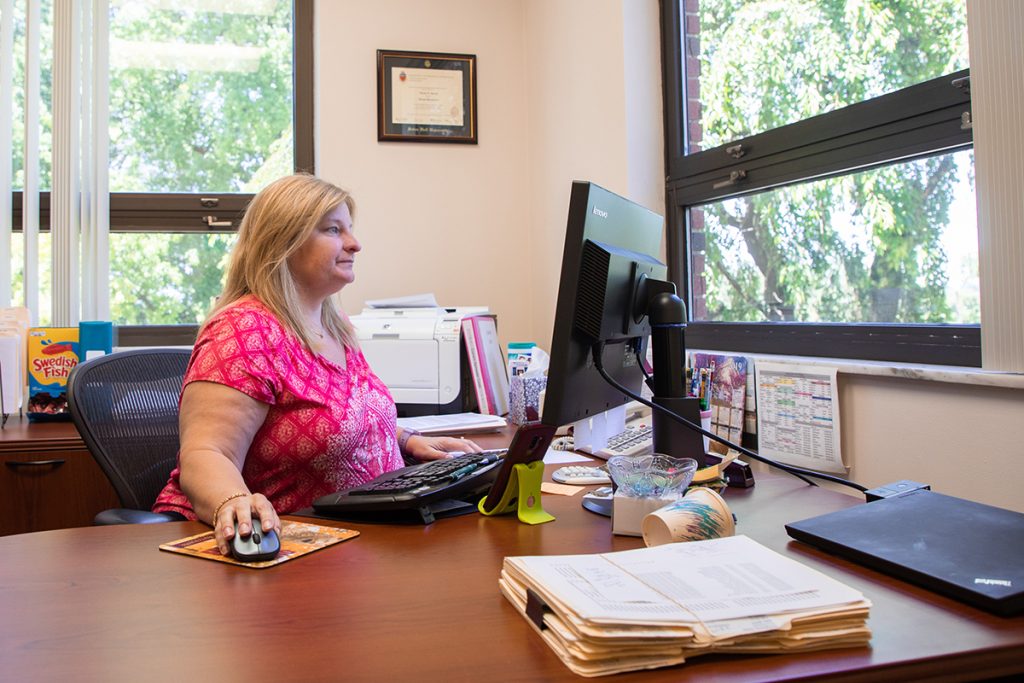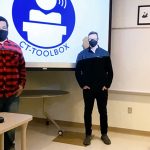KUTZTOWN, PA – KU’s University Relations (UR) office has implemented a new staff and department recognition feature. KUDOS, Kutztown University’s Dedication to Outstanding Service, focuses on university administrative departments and the individuals within them, giving the campus community a better look inside many of the working areas on campus.
This week, we sat down with the Office of Student Accounts to get an inside look at the dedicated individuals who undertake a plethora of responsibilities to ensure students understand their bills and where their money is going, including tuition assessment, invoicing of charges, accepting payments, disbursing aid released from Financial Aid, processing deferment requests received, collections management and more.
UR: Can you introduce yourselves and tell us how long you’ve been with KU?
WP: My name is Wendy Pursell, I’m the director of the Office of Student Accounts and I have been at Kutztown University for 17 years.
KA: My name is Kelsey Arcelay, I am the student accounts coordinator and front line supervisor and I’ve been at KU a little less than a year as a full-time employee. I graduated from Kutztown with a bachelor’s in psychology.
UR: What is your department’s role and mission at the university?
WP: Our office’s primary role is to be the bank of the university. People deposit money into various accounts on campus; for example, staff and faculty may have events or money is coming back to the university in the form of grants. All that money will get deposited through this office. We also manage tuition statement billing, which includes housing, meals, tuition and required fees. We accept payments, disburse and reconcile the financial aid that the Office of Financial Aid releases to us and reconcile and receive scholarship money. We do a lot more than just bill and take someone’s $20 parking ticket payment; but we do take parking ticket payments too. It’s our least favorite part of the job!
UR: Can you explain your department’s staff make-up and responsibilities?
WP: Over the years, the department has changed and grown with the times. As technology increased and more online payments were occurring, we found that less lines were happening in our office, which is great – you don’t want to have to run across campus to pay a bill. So we don’t have as many people on our front line as we used to, but we do have an accountant who helps us reconcile all the scholarship and federal funds, as well as handles all the programming of the tuition and fees set by the state, the Commonwealth of Pennsylvania and Harrisburg for the State System of Higher Education. We also have an employee who helps out with Perkins loans. We maintain the refunding process for all students who overpay their bills, whether it be overpaying by a check or overpayment from aid. We post payments that come in the mail, post 529 payments and create websites for field trips, and items like deposits for faculty-led study abroad. I set up the payment gateways to receive payments through different sources such as admissions applications; when the student pays that $35, its coming to us through a channel that I created and maintain. We also have various funds that come in through international relations and have ways to accept money from foreign countries. We have a brand new site that’s coming out similar to the new MyKU that will adapt to whatever device you’re on and will have a payment dashboard that will present a bill to you in real-time as opposed to once a month. There are a lot of new things that are coming, but all of it has to be maintained by our staff. You have the person who does accounting and programming, then you’ve got me who does a lot of creation of gateways and eMarkets, two front line people who answer the phones and do the nitty-gritty daily postings and reconciliations of their cash drawers, and a student account coordinator who is able to meet with students who need a little more hand-holding or time. Of course, students who require more are also able to schedule an appointment so we can look for different funding sources to try to keep them in school. There are a lot of federal requirements that are behind the scenes that nobody knows – it’s a lot more than making a deposit ticket and handing in money.
KA: I oversee the front line and provide help and guidance to students on their financial accounts. I primarily try to help them make sure that they’re planning. If any difficult questions or issues arise, I’m typically the person who the students come to or who the front line would reach out to to help them resolve their issues.
UR: How does your department serve students and the campus community?
WP: There are a lot of different ways we affect the campus community. One of them is depositing money for different events on campus. Say the honors department wants to have a special dinner to recognize graduating students – the money they collect will come to us and get deposited into their account, or cost center. That’s how we help the academic departments. We also facilitate collections of money for different conferences; this year, we collected money for a children’s literature conference. They had four authors come and external students, graduated students and current students could come, meet the authors, and explore children’s literature. We’re currently working on a multi-day conference with housing and meals, so we’ve created a website for that money to come in. We also provide one of the ATMs in the Student Union Building for the students who have a refund card with our refund company, BankMobile. They can use that particular ATM for free withdrawals if that’s the way they chose their refund preference. We present at orientations that help the campus community by teaching new parents and new students what we do, what we’re here for and that we’re approachable. I think that’s the big thing – people are afraid to come to us because we’re the ‘billing collector’ and have a negative connotation. Anybody that’s trying to take money from you is not going to be the person you really want to go to. But we can offer guidance and provide a lot of help, and that’s the reason we have a huge website with so many different resources that we promote during orientation sessions. We are available for anyone who wants to talk about finances or needs guidance on how they can be smarter financially and reduce loans. We work very closely with financial aid. Bernard McCree, director of Financial Aid Services, and myself speak at orientations. We call ourselves, “The Dog and Pony Show”, since we go around teaching everybody all about money. For example, the number one question we always ask at orientation is, “do you know the difference between subsidized and unsubsidized loans,” and usually three hands will go up, which is scary. So we want to make sure that we teach students so they can become informed borrowers and know where their money is going.
UR: What are the points of pride in your department?
WP: There’s a reason why I’ve been here 17 years. I started here as a graduate student and was a graduate assistant in the Department of Human Resources. What attracted me to KU was that it was close-by my home and had a great education department, which is what I went for. I got my master’s in secondary education curriculum and instruction. I also thought the campus was absolutely gorgeous. One of the unique things that we have is a spectacular view of different areas – you almost feel like you’re in the city in certain areas of the campus, but in other areas you feel like you’re in farmland. There’s just so much that it gives and I think that’s one of my favorite things about this campus. I also take great pride in the fact that we offer a lot of different academic choices. We don’t offer too many, but we do exceptionally-well in the subjects that we do have. Plus, you get a personalized touch – we’re not so large that you can’t have personalized relationships with faculty, staff and your peers. For example, I just had a student in my office last week who, when he was a freshman, was about to drop out of school because he couldn’t afford it. Even though he was in the military, he was still struggling, so we sat down and went over a plan. We got the plan settled up and I started working with him, and last week when he came in, he was giving me a hug goodbye because he graduated. That’s why I do what I do. Often times, I’ll be an unsung hero in the background, and that’s okay because I know I made a difference.
KA: I definitely enjoy working with not only my office staff, but other staff across campus. It’s a dynamic and diverse crew of people with different backgrounds, and it’s enjoyable to be able to address problems and issues with different points of view and ways to resolve them. The dynamic and diverse community we have at the university is just super great and enjoyable to work with. I also enjoy seeing the growth of students over time. There are a lot of people who come back to Kutztown because of the culture, and I see people when I was here attending my undergraduate come back for graduate studies. It’s interesting to see their growth and how they’ve been doing.
UR: What would you like people to know about your department that they may not know already?
WP: That we really do want to help. When somebody comes in to pay a parking ticket, we know they’re upset and really frustrated. So when we take the $20 and post it to their account to get rid of the hold, we do try to offer them a map and say “here’s a way to avoid that in the future.” If there is a fine or penalty, we’re happy to guide them on how to do better to avoid it in the future. We get people at their worst sometimes and they usually apologize to us later, which is good, but we try to take that teachable moment to let them know that that really wasn’t the right way to respond to that situation. I think we have this great opportunity to help students grow as people in a very difficult, strenuous area of money. We really are here to help, but I think students don’t get to take full advantage of that because they think we’re just here to take their money for parking tickets or ID replacements.
KA: I think the most important thing that we want people to know is that we’re here to help. We’re not just here to collect your money. We want students to feel comfortable reaching out to us if they have questions about their accounts. Some people think that we’re not here to discuss what’s going on, and we definitely are. We like to be able to explain what’s happening with the account and help you financially plan not just for here at KU, but also for the future since that’s what students are doing here. We’re here for any questions students may have.
UR: How can the campus community learn more or become involved with your department?
WP: As mentioned earlier, our department does have a pretty extensive website. I think people have learned over the years that we have so much information because we have so many different types of students that comes here. One of the things that makes the campus great is the diversity. We have a diverse student population, but with that diverse student population also comes a diverse need for help and guidance. While one family may need to know simply how to submit the bill to a 529 plan to pay it, another family may need to know if they can pay with multiple payment types. There’s a diverse need, and we can accommodate that need here. Can I always find a way for a student to remain at KU? No, I can’t always. Not often, but it does happen. But we are always willing to work with students and their families to try to come up with some game-plans and look at every resource available to the student. I think the campus community could benefit from looking at our website, seeing what we have to offer and promoting us. Send students to us if they have concerns early on so we can try to help them while there’s time to fix things.
UR: What’s your favorite thing about your KU experience?
WP: When I first started in payroll in my graduate assistantship, I met an international student from Great Britain and we became pretty close. I offered him guidance and helped him along. After he graduated he found me on Facebook. He said, “I just wanted to let you know that if it wasn’t for you and the time that you spent going over things with me, I never would’ve gotten to where I am.” He’s an accountant now, is married and has kids and is doing fantastic. Those stories where I know I’ve made a difference are my favorite. One time, two pizzas just randomly showed up to our office and we didn’t know why. Two days later, I got a card in the mail from a parent that said, “Thanks for all your patience and helping us through the last four years.” Little things like that are why I do what I do and work late often. It’s worth it. It’s what we’re here for.
UR: What does “It’s Good to be Golden” mean to you?
WP: It’s a sense of pride in what I do and my ability to make a difference. Years ago, one of our slogans was “making a difference,” and I feel like that still applies to “it’s good to be golden.” I can make a difference in a student’s life or in a parent’s life. For example, there was a parent who felt like they’d gone around the campus looking for help and wasn’t able to get it; I was able to help them feel like they finally found someone to listen to and let them feel comfortable knowing that their child is here and safe. I can also make a difference in the economic structure of this campus, knowing that without my little piece, the rest of it doesn’t work. “It’s good to be golden” is almost like a puzzle – without any of us, it doesn’t work.
KUDOS is published twice monthly by the office of University Relations. All issues can be found at www.kutztown.edu/KUDOS.




